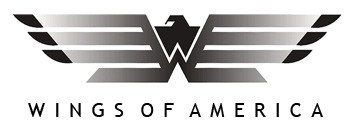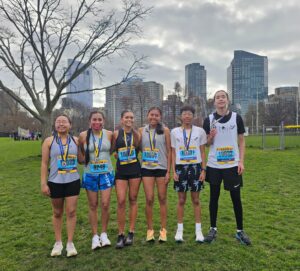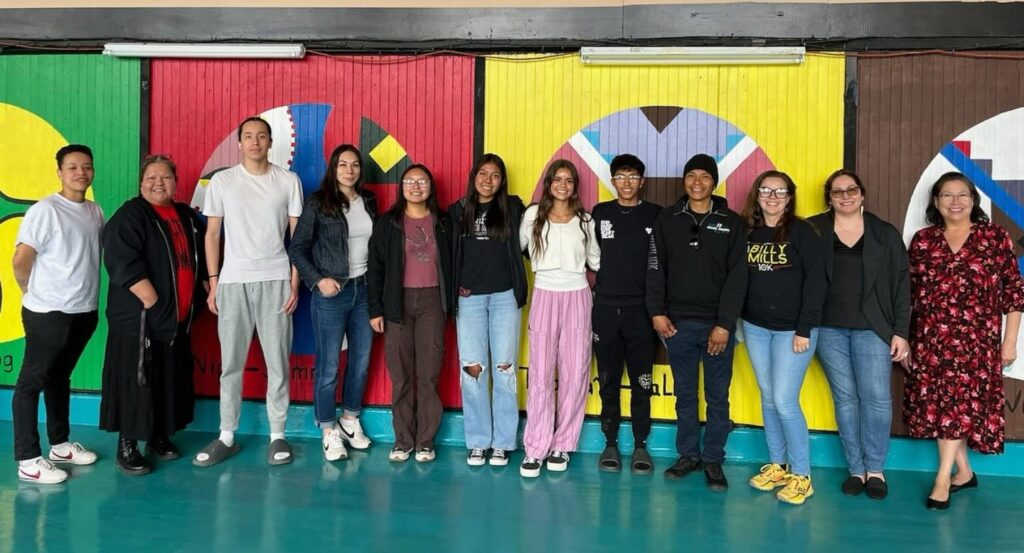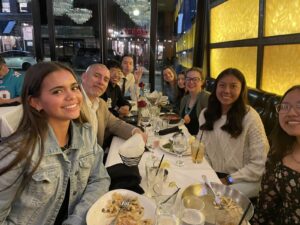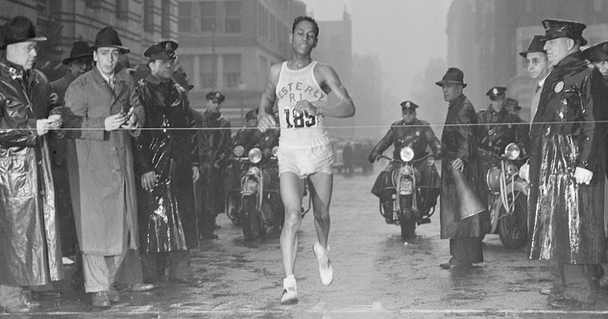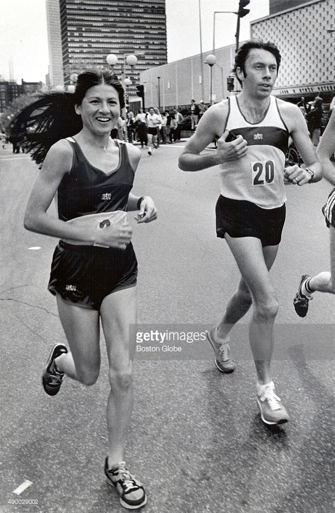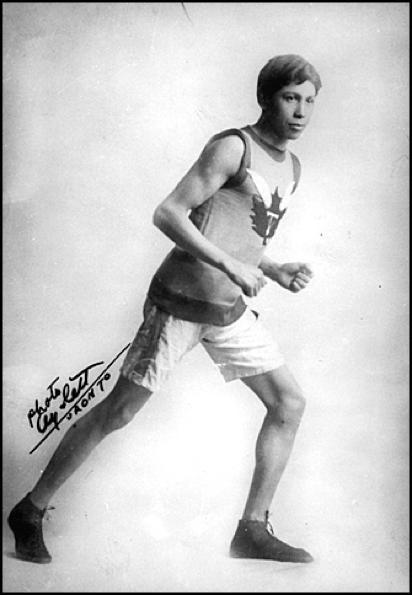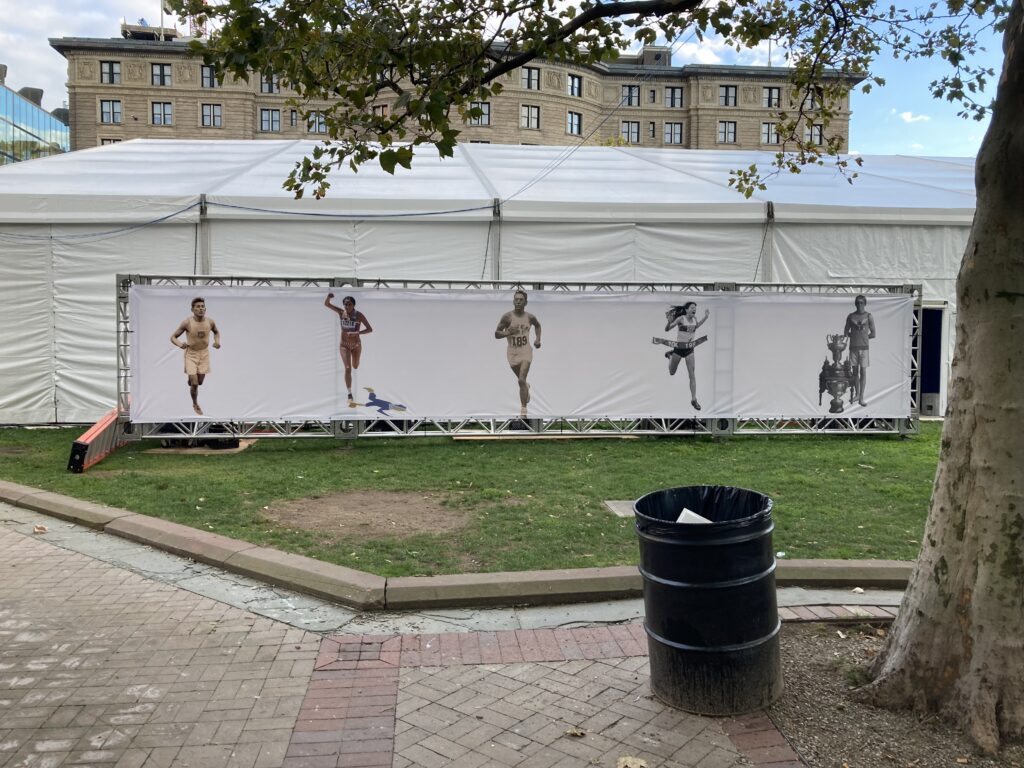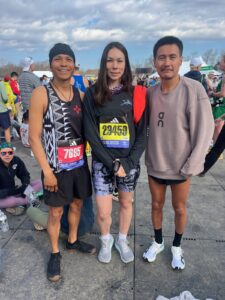
(L-R) Justin, Andy and former Wings National Team Member (2006), Craig Curley, wait together in “Athlete’s Village” before starting the marathon.
For the sixth year since 2017, Wings of America partnered with the Boston Athletic Association (B.A.A.) to commemorate the legacy of Native distance runners and promote the aspirations of an upcoming generation of student-athletes. As part of the Pursuit Program, Wings selected 5 American Indian high school JUNIORS to travel with the organization to Boston during “Marathon Weekend”, April 11th-16th, 2024. The students’ airfare, meals, ground transportation and (5K) race entry fees were covered by the fundraising efforts of the group chaperones and charity runners, Andy Snowball (Muscogee Nation and Winnebago Tribe of Nebraska) and Justin Casiquito (Jemez Pueblo)! Together, they raised $7,877.25 from 69 donors. And even after a busy weekend of traversing Bean Town with the Pursuit students, Andy and Justin finished the marathon in 5:15:44 and 3:33:25, respectively. We are so proud of them and thankful for their fundraising and training efforts!
We are also extremely grateful for two host families from Newton for agreeing to host our students and chaperones in their neighboring homes. With the hefty premium imposed on hotel rooms in the Boston area during “marathon weekend”, it would require A LOT more funds to be raised if we didn’t create these connections. Since 2017, Pursuit students have stayed everywhere from Cambridge to Boston’s “South End”, and now further out along the marathon route in beautiful “Chestnut Hill”. We look forward to continuing to foster these relationships and witnessing the cultural exchange between Native youth and “New Englanders”.
Before experiencing the power and excitement of a “world major” distance race, students visited Boston-area universities while learning to navigate the city. After an early morning run along the Charles River, Pursuit students spent their first full day of their trip in Cambridge hosted by the Harvard University Native American Program (HUNAP). Our steadfast partners at HUNAP arranged a full day of campus tours, college admissions counseling, a visit with a Native curator at the Peabody Museum and a lunch presentation by Amira Madison (Aquinnah Wampanoag), a councilwoman for her Tribe and Boston’s first “Supporting Indigenous Communities” Program Manager.
On Saturday, the Pursuit students got to run the B.A.A. 5K alongside former Pursuit Chaperones Jordan Marie-Daniel (Kul Wicasa Lakota) and Verna Volker (Diné). Later, they were given a tour of Northeastern University, with the opportunity to meet and ask questions of Kylie Bemis (Zuni Pueblo), a runner and faculty member of the Khoury College of Computer Sciences.
The next day, the Wings crew visited the North American Indian Center of Boston (NAICOB). NAICOB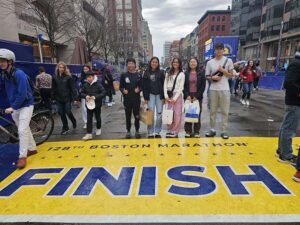 was first established in 1969 as the Boston Indian Council and has been serving the Indigenous community of Boston ever since. We are very thankful to Raquel Halsey (Mandan, Hidatsa, and Arikara Nation), Reggi Alkiewicz (Member of Nunatsiavut Government, Labrador, Canada) and the rest of the NAICOB Staff for making our group feel so welcomed. They provided a specially-prepared lunch, and even went out of their way to purchase a cake for one of our Pursuit students, Stella Hall, to celebrate her birthday! After their visit at NAICOB, the Pursuit students went to the New England Aquarium and also got to roam around Boylston St. to take photos at the marathon finish line.
was first established in 1969 as the Boston Indian Council and has been serving the Indigenous community of Boston ever since. We are very thankful to Raquel Halsey (Mandan, Hidatsa, and Arikara Nation), Reggi Alkiewicz (Member of Nunatsiavut Government, Labrador, Canada) and the rest of the NAICOB Staff for making our group feel so welcomed. They provided a specially-prepared lunch, and even went out of their way to purchase a cake for one of our Pursuit students, Stella Hall, to celebrate her birthday! After their visit at NAICOB, the Pursuit students went to the New England Aquarium and also got to roam around Boylston St. to take photos at the marathon finish line.
Marathon Monday, or “Patriot’s Day”, was an experience the Pursuit students will carry with them for years to come! It is important to acknowledge this particular experience because of the inspiration it brings to the students. By the end of the day the Pursuit students were thinking of running their first marathon and which one it would be. Their excitement was palpable as they anxiously scanned the marathon tracking app and the approaching crowd of runners, hopeful to catch a glimpse of their chaperones or one of the other Native runners they had met over the course of the weekend.
As a “wind down” from the electric atmosphere of the Boston Marathon crowd, the students were treated to dinner by Scott Dinsmore (Pakan’yani Maidu of Strawberry Valley Rancheria), Chief Revenue Officer for Tribal Ready. Tribal Ready focuses on bringing broadband to Native communities across the United States and we are extremely thankful to their business for sponsoring such a memorable meal on the last night of the Pursuit students’ trip!
The 5 students chosen for this year’s program were:
-
Mathius Garcia (Jicarilla Apache): Navajo Preparatory School, Farmington, NM
-
Stella Hall (Hopi): Highland High School, Gilbert, AZ
-
Stella is also a 2x Wings National Team Member, as well as a former Wings summer facilitator.
-
-
Jade Haven (Diné): Window Rock High School, Ft. Defiance, AZ
-
Rylan Parker (Winnebago Tribe of Nebraska): Homer Community School, Winnebago, NE
-
Janessa Segay (Diné): Chinle High School, Chinle, AZ
-
Janessa is a 3x Wings National Team Member, as well as a former Wings summer facilitator.
-
Pursuit Program History:
After going strong from 2017-2019, the Pursuit Program was cancelled in 2020 and 2021 due to COVID-19. We returned to Boston again in 2022 with the understanding that the risks associated with the virus were less, but still present.
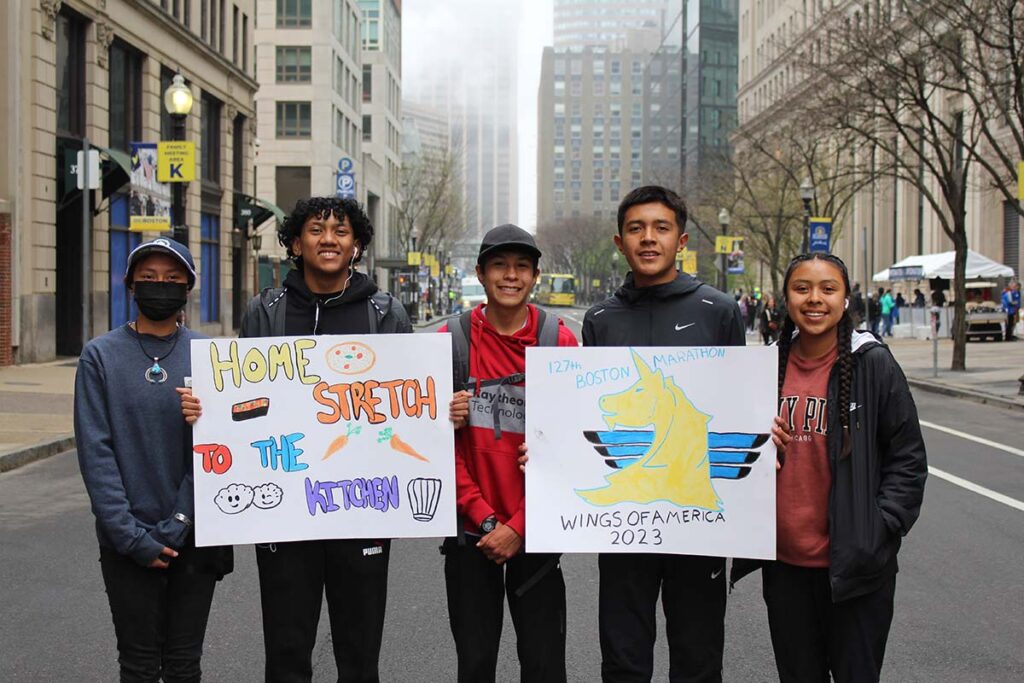
2023 Pursuit Program Students (L-R: Nicole Tsosie, Isaiah Sandoval, Cassius Maloney, Theodore Roundface, Emily Garcia)
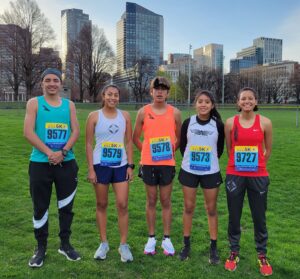
2022 “Pursuit” Program Students: (L-R) Devin Lansing, Emily Manuelito, Shaud Becenti, Kaydence Platero, Lia Castillo
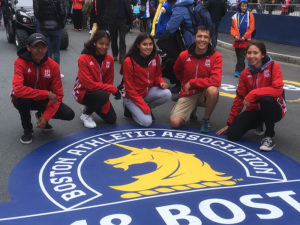
2018 Boston “Pursuit” Program students (L-R: Ty McCray, Precious Robinson, Netawn Marsoobian, Isaiah Honyumptewa, LaKyla Yazzie)
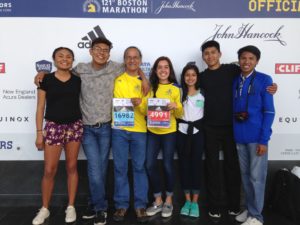
2017 Pursuit program participants pose with Wings’ charity runners Newell Lewey (Passamaquoddy) and Beth Wright (Laguna).
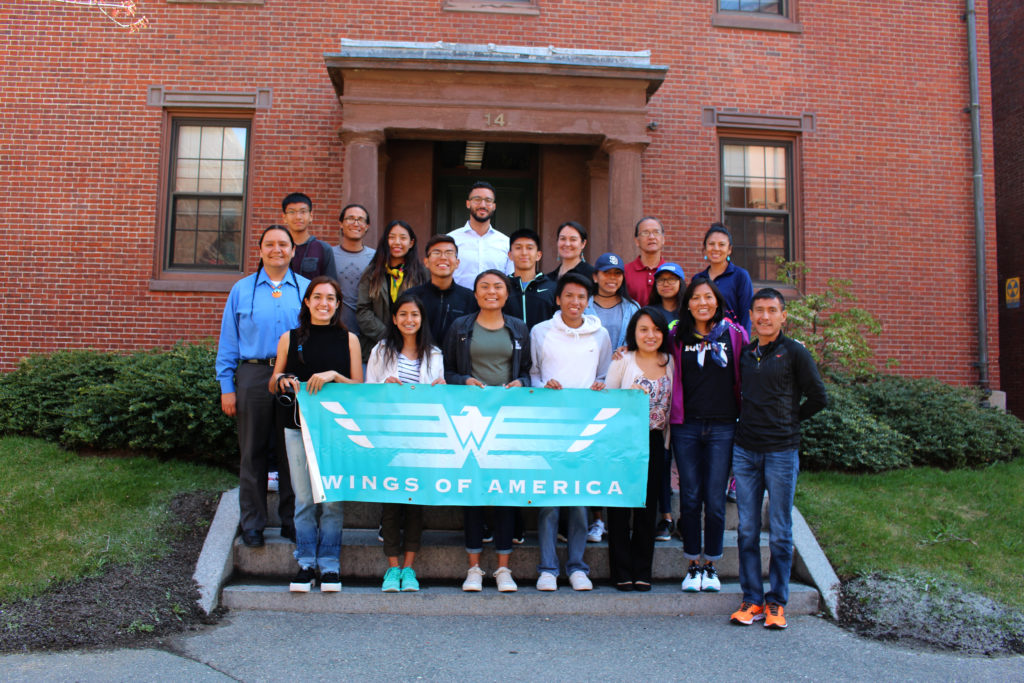
Pursuit Program and Harvard University Native American Program (HUNAP) students. We are thankful to HUNAP staff and Harvard Native students for consistently hosting our runners to help them see the realities of higher education.
The history behind Native runners at Boston and the “Pursuit” Program:
When Ellison “Tarzan” Brown beat local favorite Johnny Kelly in the 1936 Boston Marathon, his win was classified as dumb luck. How could Tarzan, a poverty stricken brick layer from the Naragansett Tribe of Rhode Island, have beaten one of the world’s greatest distance runners? He had to set a new course record in 1939 to get the respect and recognition he deserved. But Tarzan isn’t the only runner to have challenged the crowd’s understanding of “Indians” in this historic race.
After his coach, “Mohawk” Bill Davis, finished second in 1901, Tom Longboat (Onondaga) captured a win in 1907. Soon after, Andrew Sockalexis (Penobscot) finished second two years in a row (1911-12). Patti Dillon (Micmac) made women a part of the impressive legacy of tenacious Indigenous runners at Boston by finishing second in 1979, 1980 and 1981.
In 2016, to commemorate the 80th anniversary of Tarzan’s first win, the Boston Athletic Association (B.A.A.) and Harvard University invited Billy Mills (Oglala Lakota) to speak about his own path on the way to distance running legend. Though he came of age nearly 30 years after Tarzan, Billy also struggled to break through the world’s perceptions of him as “Indian”. Only after taking gold in one of the most exciting 10,000 Meter runs in Olympic history, did Billy feel validated as a citizen of the modern world. That victory has enabled him to inspire countless listeners to fight racial and cultural biases using education and sport as foundations for equality.
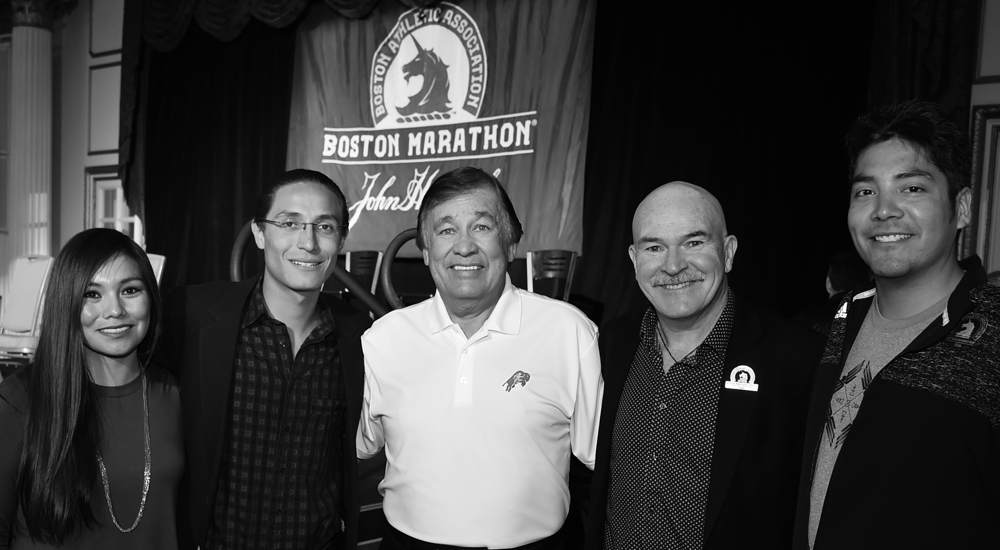
Wings runners pose with Billy Mills and Rob de Castella, 1986 winner of the Boston Marathon and founder of the Indigenous Marathon Project. Photo: Jim Davis
As part of the celebration of Tarzan’s wins, Wings was asked to bring representatives of the newest generation of Native distance running champions. At an evening of presentations and panel discussions featuring university professors, acclaimed authors, Indigenous runners from outside North America, descendants of Native top-finishers at Boston and the Faithkeeper of the Turtle Clan of the Onondaga Nation, Oren Lyons, Wings runners made it known that the future of Native running remains bright. The “Pursuit” program aims to continue the conversations, learning opportunities and inspiration felt by everyone involved in the 2016 celebration. With any luck, it will help foster new role models for Indian Country and help those involved break free of any outsiders’ perceptions that might discourage them from pursuing greatness.
Boston On Indigenous Peoples’ Day (10/11/2021):
When the Boston Athletic Association (B.A.A.) re-scheduled the 125th running of the Boston Marathon to October 11, 2021 due to COVID, there was little awareness amongst race officials that it was also Indigenous Peoples Day (IDP). But then they started to hear complaints from Indigenous organizers and their allies. They felt the Marathon was going to eclipse a holiday officially recognized by multiple municipalities along the route.
Long before the peak of the IDP controversy, Wings decided that we would not select a crew of high school juniors to travel to Boston during Marathon weekend for the “Pursuit” Program. The risks and unknowns associated with COVID, especially for young people, were still too many. But the B.A.A. offered one “charity bib” to help raise funds for future students. Artist and runner, Yatika Starr Fields (Osage, Cherokee & Muscogee Creek), jumped at the chance. He (and Wings) thought: what better way to honor the legacy of Indigenous People on IDP than to run strong on the world stage?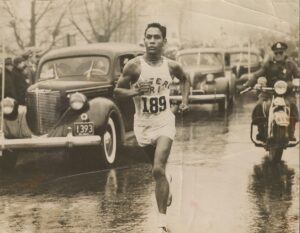
Eventually, the B.A.A. offered a public apology and donation to Indigenous organizers in Newton, whose IDP celebration had been jeopardized. Prior to that, race organizers began to seek advice from Wings board member and Marathon matriarch, Patti Dillon, about how to honor Indigenous Peoples on race day. As a Mi’kmaq woman and three-time Boston runner-up (’79-’81), her insight was invaluable. After conferring with friend and fellow board member, Sanjay Rawal, their advice to the B.A.A. was “work with Wings”.
Because Yatika was already going to be in “Bean Town” for the race, Wings asked if he might use his talents as a muralist to build on the B.A.A.’s recognition of Native champions that began in 2016. Their first idea: paint a mural honoring 2-time Boston winner, Ellison ‘Tarzan’ Brown (Narragansett), on a wall along the Marathon course. Ideally, the tribute could be done somewhere in Newton, where Tarzan clinched his first victory in 1936 after putting in a surge that demoralized defending champion, Johnny Kelley, on the now infamous “heartbreak hill”.
With only 6-weeks until race day, finding a wall and willing property owner seemed like a long shot. But the B.A.A. thought up an alternative: a 35’X7’ vinyl “canvas” stretched on a truss system in Copley Square. Steps away from the Marathon finish line, nestled between the tents used to check the vaccination or COVID test status of each participant, the “wall” was sure to catch a lot of attention. The B.A.A. also provided Wings with 6 additional race bibs, to be offered to Indigenous runners that could be ready for Boston on short notice.
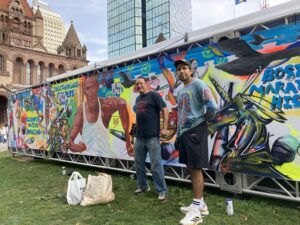 At the artists’ request, the B.A.A. had running cutouts of 5 notable Indigenous runners that made their mark at Boston printed on the “base” canvas: Tarzan Brown, Tom Longboat (Onondaga), Patti Dillon, Andrew Sockalexis (Penobscot) and Jordan Marie Daniel (Kul Wicasa Lakota). Between them, Yatika began to weave a free-form mesh of color and commemorative text, while local artist Robert Peters (Mashpee Wampanoag) worked on a “blown-up” portrait of Tarzan over the life-size cutout printed on the vinyl.
At the artists’ request, the B.A.A. had running cutouts of 5 notable Indigenous runners that made their mark at Boston printed on the “base” canvas: Tarzan Brown, Tom Longboat (Onondaga), Patti Dillon, Andrew Sockalexis (Penobscot) and Jordan Marie Daniel (Kul Wicasa Lakota). Between them, Yatika began to weave a free-form mesh of color and commemorative text, while local artist Robert Peters (Mashpee Wampanoag) worked on a “blown-up” portrait of Tarzan over the life-size cutout printed on the vinyl.
The two worked casually, taking time to speak to passersby about the history embedded in the work and the significance of the Marathon on IDP. It was also used as a meeting place for morning shakeouts amongst Indigenous runners on Friday and Saturday before Marathon Monday. At one of these runs, Wings was presented with a $10,000 donation from the Sycuan Band of the Kumeyaay Nation to support future youth programs. More than just a “live painting”, the mural became a place for Indigenous runners to create community, support one another and feel proud of the running tradition their presence sustained.
After two days of work, what was once a blaringly white rectangle had become a colorful ribbon in celebration of movement. Finally, with humble disregard for his gestural spray can work, Yatika helped adhere 10 life size cutouts of Indigenous runners that would be racing the Marathon on IDP. As he stuck his own silhouette next to Patti’s, the mural became past, present and future in one- strong medicine for all stepping to the start line in a few days.
The night before the race, Patti and Wings were honored by the B.A.A. at a reception attended by Tarzan Brown’s family, Boston Mayor, Kim Janey, and U.S. Secretary of the Interior, Deb Haaland (Laguna Pueblo). In her comments, Madame Secretary jokingly promised not to win the race the next day. Instead, she vowed to “run her own race, thankful that Creator has given me good health and the ability to run 26.2 miles with the people of the world.” As Patti fired the official starting gun the next morning, we can only hope that more runners than ever left the line with such humble appreciation for the gift.
Wings looks forward to continuing our collaboration with the B.A.A. knowing we have a steadfast partner to help us elevate Native perspectives within the running world. We are thankful that the mural was displayed at two celebrations hosted by the Newton Indigenous Peoples’ Day committee, as well as the 2022 B.A.A. 10K before being entrusted to Wings. As it was boxed up and sent to Albuquerque, a prayer was offered by Hiawatha Brown, Tarzan Brown’s grandson, and rolled up with cedar, tobacco, a braid of sweetgrass and an eagle feather. It arrived safely in December of 2022 and is now on display in the atrium of the Wings office. We welcome visitors to come see it for themselves.
